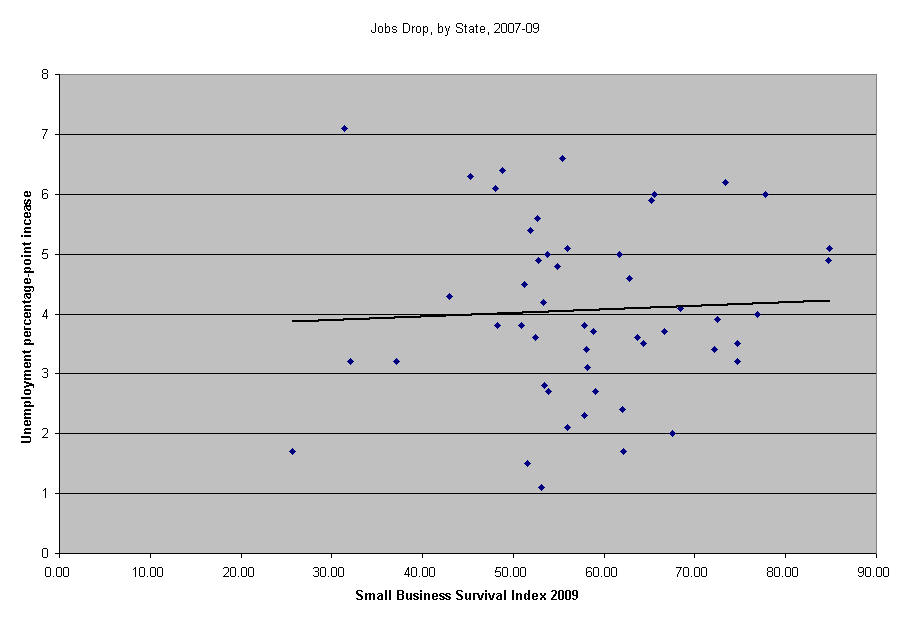California’s jobs crash worsens
March 9, 2010
By JOHN SEILER
In some of the articles I’ve written for CalWatchdog, I’ve devised new ways of looking at policies and their consequences, such as my “California Jobs Gap” calculation here and here. It showed that California’s unemployment rate was much higher than the national average even before the recession began – even, in fact, during the boom times.
I’ve come up with a new measure I call the “California Jobs Crash.” It looks at how much more the recession has dropped employment here than in most states. It compares data from three years:
2007: The base year. The recession began that year in December, according to the National Bureau of Economic Research. So it’s a good year to start: the last year of prosperity before the crash.
2008: The recession dug in.
2009: The recession continued, becoming the worst since World War II.
On March 3, 2010, the Bureau of Labor Statistics released its updated “Regional and State Unemployment 2009 Annual Average Summary.” (Data for 2009, as well as 2008 and my calculations, are provided in the Appendix, below.)
So we now have comprehensive, accurate data for three years: one in prosperity, two in recession.
“Jobs Crash” Defined
My new definition is “Jobs Crash.” It’s the increase in the unemployment rate during a recession. California’s unemployment rate increased from:
- 5.4 percent in 2007 to 7.2 percent in 2008; an increase of 1.8 percentage points (the Jobs Crash);
- 7.2 percent in 2008 to 11.4 percent in 2009; an increase of 4.2 percentage points (the Jobs Crash);
- 6 percentage points is the total increase for the two years (1.8 + 4.2).
Put my way, it’s a 6-point Jobs Crash. It’s the seventh-highest Jobs Crash among the 50 states and the District of Columbia.
The highest Jobs Crash states were:
State____ Jobs Crash Points
Nevada 7.1
Michigan 6.6
Alabama 6.4
Florida 6.3
Rhode Island 6.2
S. Carolina 6.1
California 6.2
As you can see, three of the four so-called “Sand States” most slammed by the mortgage boom/bust were especially hit hard by the Jobs Crash: Florida, Nevada and California. Arizona, the fourth Sand State, didn’t do too badly, with a 4.9 Jobs Crash number.
The Jobs Crash and friendliness to business
I thought I would plot the Jobs Crash numbers by state against some figures I have used before, the “Small Business Survival Index 2009.” It ranks the states by their tax rates, regulatory climate and general attitude toward business. Here’s the chart I came up with:

The X axis, on the bottom, shows the burden of government, from the SBS Index. The higher the number, the more unfriendly a state is to business.
The Y axis, on the left, shows the Jobs Crash. The individual points represent states.
As you would expect in a diverse country, the plot points are varied. But the Trend Line shows a clear pattern of states with a worse SBS Index – being more hostile to business – having a higher Jobs Crash number.
I didn’t post it, but I also plotted a graph of the same data – but left out the four Sand States. The Trend Line was almost identical. In other words, even if we discount the housing crash in the states hit hardest by it, it’s clear that, in general, the less friendly a state is to business, the higher its Jobs Crash number.
Budget considerations
The implications of this for the state budget should be taken into account. “The state government, by raising taxes last year, had something to do with the high unemployment rate,” Esmael Adibi told me; he’s director of the A. Gary Anderson Center for Economic Research and Anderson Chair of Economic Analysis at Chapman University.
“Down the road, we won’t do as well, because of the same problem,” he added. “The potential for raising taxes makes us perform much weaker than other states.”
He also pointed to the continued problems in the housing market from the housing crash. “California was proportionally more dependent on the mortgage industry and construction. Look at Florida and Nevada. They’re the same as California – common problems.”
John Seiler, an editorial writer with The Orange County Register for 19 years, is a reporter and analyst for CalWatchDog.com. His email: [email protected].
APPENDIX
| Jobs Crash | ||||
| SBS Index | …..2007-08 | ….2008-09 | …..Total | |
| Alabama | 48.82 | 1.5 | 4.9 | 6.4 |
| Alaska | 51.55 | 0 | 1.5 | 1.5 |
| Arizona | 52.80 | 1.7 | 3.2 | 4.9 |
| Arkansas | 56.01 | 0 | 2.1 | 2.1 |
| California | 77.75 | 1.8 | 4.2 | 6 |
| Colorado | 48.25 | 1 | 2.8 | 3.8 |
| Connecticut | 66.63 | 1.1 | 2.6 | 3.7 |
| Delaware | 62.78 | 1.4 | 3.2 | 4.6 |
| Florida | 45.28 | 2.1 | 4.2 | 6.3 |
| Georgia | 53.78 | 1.6 | 3.4 | 5 |
| Hawaii | 68.45 | 1.3 | 2.8 | 4.1 |
| Idaho | 61.71 | 1.9 | 3.1 | 5 |
| Illinois | 55.98 | 1.4 | 3.7 | 5.1 |
| Indiana | 52.60 | 1.3 | 4.3 | 5.6 |
| Iowa | 67.49 | 0.4 | 1.6 | 2 |
| Kansas | 57.81 | 0 | 2.3 | 2.3 |
| Kentucky | 54.88 | 0.9 | 3.9 | 4.8 |
| Louisiana | 58.11 | 0.8 | 2.3 | 3.1 |
| Maine | 74.70 | 0.8 | 2.7 | 3.5 |
| Maryland | 64.34 | 0.9 | 2.6 | 3.5 |
| Massachusetts | 72.52 | 0.8 | 3.1 | 3.9 |
| Michigan | 55.38 | 1.3 | 5.3 | 6.6 |
| Minnesota | 72.15 | 0.8 | 2.6 | 3.4 |
| Mississippi | 53.44 | 0 | 2.8 | 2.8 |
| Missouri | 53.28 | 1 | 3.2 | 4.2 |
| Montana | 59.04 | 1.1 | 1.6 | 2.7 |
| Nebraska | 62.14 | 0.4 | 1.3 | 1.7 |
| Nevada | 31.35 | 2 | 5.1 | 7.1 |
| New Hampshire | 62.00 | 0 | 2.4 | 2.4 |
| New Jersey | 84.73 | 1.2 | 3.7 | 4.9 |
| New Mexico | 58.10 | 0.7 | 2.7 | 3.4 |
| New York | 76.94 | 0.9 | 3.1 | 4 |
| North Carolina | 65.50 | 1.6 | 4.4 | 6 |
| North Dakota | 53.04 | 0 | 1.1 | 1.1 |
| Ohio | 51.25 | 0.9 | 3.6 | 4.5 |
| Oklahoma | 53.87 | 0 | 2.7 | 2.7 |
| Oregon | 65.18 | 1.3 | 4.6 | 5.9 |
| Pennsylvania | 57.85 | 1 | 2.8 | 3.8 |
| Rhode Island | 73.34 | 2.6 | 3.6 | 6.2 |
| South Carolina | 48.00 | 1.3 | 4.8 | 6.1 |
| South Dakota | 25.69 | 0 | 1.7 | 1.7 |
| Tennessee | 51.86 | 1.6 | 3.8 | 5.4 |
| Texas | 32.08 | 0.5 | 2.7 | 3.2 |
| Utah | 52.40 | 0.7 | 2.9 | 3.6 |
| Vermont | 74.72 | 0.8 | 2.4 | 3.2 |
| Virginia | 50.84 | 1 | 2.8 | 3.8 |
| Washington | 42.96 | 0.8 | 3.5 | 4.3 |
| West Virginia | 63.69 | 0 | 3.6 | 3.6 |
| Wisconsin | 58.80 | 0 | 3.7 | 3.7 |
| Wyoming | 37.07 | 0 | 3.2 | 3.2 |
| District of Columbia | 84.80 | 1.5 | 3.6 | 5.1 |
| Average | 58.11 | |||
| SBS Index 2009 | 2007-08 | 2008-09 | Total | |
| Alabama | 48.82 | 1.5 | 4.9 | 6.4 |
| Alaska | 51.55 | 0 | 1.5 | 1.5 |
| Arizona | 52.80 | 1.7 | 3.2 | 4.9 |
| Arkansas | 56.01 | 0 | 2.1 | 2.1 |
| California | 77.75 | 1.8 | 4.2 | 6 |
| Colorado | 48.25 | 1 | 2.8 | 3.8 |
| Connecticut | 66.63 | 1.1 | 2.6 | 3.7 |
| Delaware | 62.78 | 1.4 | 3.2 | 4.6 |
| Florida | 45.28 | 2.1 | 4.2 | 6.3 |
| Georgia | 53.78 | 1.6 | 3.4 | 5 |
| Hawaii | 68.45 | 1.3 | 2.8 | 4.1 |
| Idaho | 61.71 | 1.9 | 3.1 | 5 |
| Illinois | 55.98 | 1.4 | 3.7 | 5.1 |
| Indiana | 52.60 | 1.3 | 4.3 | 5.6 |
| Iowa | 67.49 | 0.4 | 1.6 | 2 |
| Kansas | 57.81 | 0 | 2.3 | 2.3 |
| Kentucky | 54.88 | 0.9 | 3.9 | 4.8 |
| Louisiana | 58.11 | 0.8 | 2.3 | 3.1 |
| Maine | 74.70 | 0.8 | 2.7 | 3.5 |
| Maryland | 64.34 | 0.9 | 2.6 | 3.5 |
| Massachusetts | 72.52 | 0.8 | 3.1 | 3.9 |
| Michigan | 55.38 | 1.3 | 5.3 | 6.6 |
| Minnesota | 72.15 | 0.8 | 2.6 | 3.4 |
| Mississippi | 53.44 | 0 | 2.8 | 2.8 |
| Missouri | 53.28 | 1 | 3.2 | 4.2 |
| Montana | 59.04 | 1.1 | 1.6 | 2.7 |
| Nebraska | 62.14 | 0.4 | 1.3 | 1.7 |
| Nevada | 31.35 | 2 | 5.1 | 7.1 |
| New Hampshire | 62.00 | 0 | 2.4 | 2.4 |
| New Jersey | 84.73 | 1.2 | 3.7 | 4.9 |
| New Mexico | 58.10 | 0.7 | 2.7 | 3.4 |
| New York | 76.94 | 0.9 | 3.1 | 4 |
| North Carolina | 65.50 | 1.6 | 4.4 | 6 |
| North Dakota | 53.04 | 0 | 1.1 | 1.1 |
| Ohio | 51.25 | 0.9 | 3.6 | 4.5 |
| Oklahoma | 53.87 | 0 | 2.7 | 2.7 |
| Oregon | 65.18 | 1.3 | 4.6 | 5.9 |
| Pennsylvania | 57.85 | 1 | 2.8 | 3.8 |
| Rhode Island | 73.34 | 2.6 | 3.6 | 6.2 |
| South Carolina | 48.00 | 1.3 | 4.8 | 6.1 |
| South Dakota | 25.69 | 0 | 1.7 | 1.7 |
| Tennessee | 51.86 | 1.6 | 3.8 | 5.4 |
| Texas | 32.08 | 0.5 | 2.7 | 3.2 |
| Utah | 52.40 | 0.7 | 2.9 | 3.6 |
| Vermont | 74.72 | 0.8 | 2.4 | 3.2 |
| Virginia | 50.84 | 1 | 2.8 | 3.8 |
| Washington | 42.96 | 0.8 | 3.5 | 4.3 |
| West Virginia | 63.69 | 0 | 3.6 | 3.6 |
| Wisconsin | 58.80 | 0 | 3.7 | 3.7 |
| Wyoming | 37.07 | 0 | 3.2 | 3.2 |
| District of Columbia | 84.80 | 1.5 | 3.6 | 5.1 |
| Average | 58.11 |
Related Articles
Ricci Zombeck Would Let Your Kid Drown
Commentary JUNE 3, 2011 By STEVEN GREENHUT Alameda Fire Division Chief Ricci Zombeck (the one without the big hat) has
More Government Health Care?
AUG. 23, 2010 By KATY GRIMES “Consumer friendly, seamless enrollment, affordable health coverage is on the way in California,” says
Look for the budget trailer-bill details
Gov. Jerry Brown’s budget proposal, released Friday, is just that: a proposal. It’s a starting point. What’s key are the



